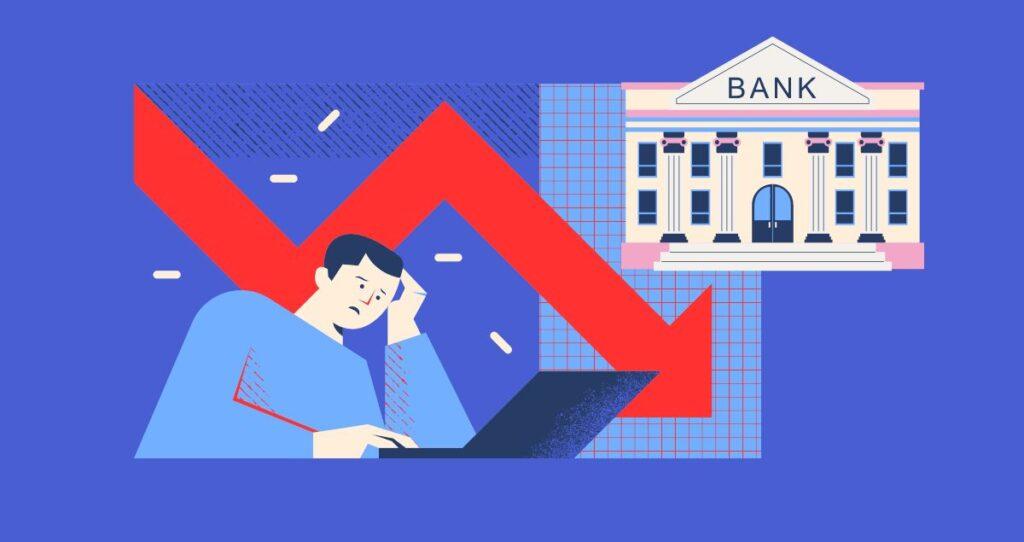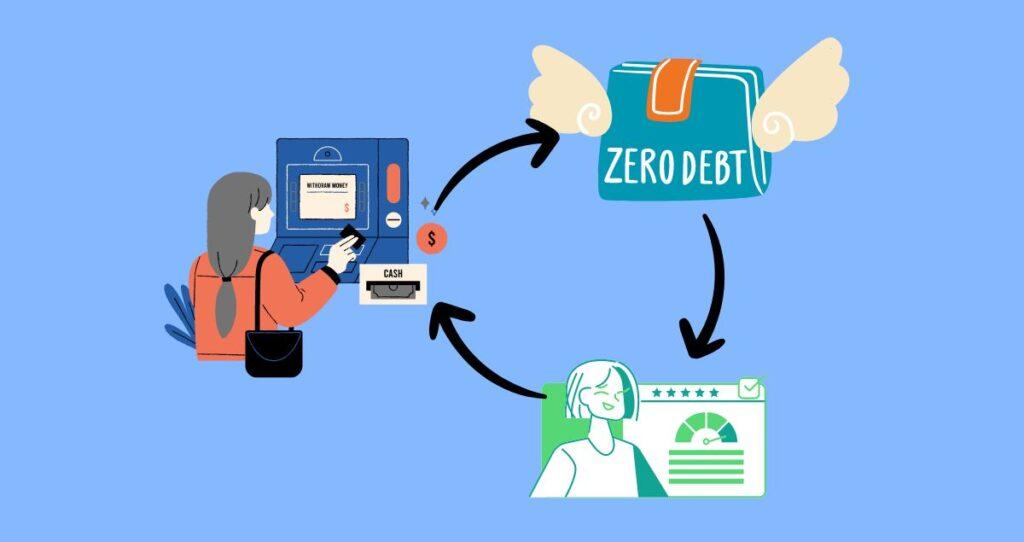Navigating the complicated world of mortgages can be difficult and stressful, but even more so if your bank goes bankrupt. No one wants to think of their mortgage company collapsing, but it’s important to know what occurs in the event of such a situation. This article will explain what happens when your mortgage company goes bankrupt and what it means to your mortgage terms, monthly payments, and underlying conditions.
When a mortgage provider such as a bank goes under, it usually gets bought by another business. In addition, there are protections in place to make sure that borrowers are not left in limbo when banks fail. By default, banks are insured by large insurance institutions that can step in in case of bankruptcy. Furthermore, the government can also step in to bail out the bank or the FDIC could facilitate the loans to be taken over by another bank.
The following are the details of what you need to know about your mortgage and its terms when your mortgage company goes bankrupt.
What happens when your mortgage company goes bankrupt?
When your mortgage company goes bankrupt or goes out of business, it does not have an effect on your mortgage. Usually, when a mortgage company such as a bank goes out of business, it gets bought by another company. The new company also buys all loans and takes over their servicing rights.
So, if your mortgage company suddenly closes its doors, your loan will more likely be sold to another company. Your loan terms will stay the same even if it is owned by a different mortgage servicer.
In the event your mortgage company goes bankrupt, your escrow account also gets transferred to the new mortgage servicer. This ensures that your property tax and insurance are fully paid on time without late payments or delays.
Do you still make mortgage payments when your mortgage company goes bankrupt?
A common misconception is that many think they don’t have to make payments when their mortgage company goes bankrupt. Unfortunately, this is not true. When your mortgage provider goes out of business, you must still make your mortgage payments. Going out of business does not mean your mortgage will disappear.
The way loans are structured is complex in a way that even in your mortgage holders or servicers go out of business; your loan gets sold to another institution. That is if your bank goes bankrupt, another bank or institution will buy your loan and take over its servicing rights. Nothing will change about your loan or its terms. That is your monthly payments will stay the same, interest rate will not change.
Any payment you make will go to the new servicer after a certain time. You will be notified about your payment structures together with all information about your new mortgage servicer.
Will my mortgage terms stay the same if my loan is sold to another company?
It is possible that your mortgage can be sold to another company. For example, if your bank goes bankrupt, you might be wondering what will happen to your loan or where to pay your monthly payments.
During the bankruptcy proceedings, your loan will be sold to another company that will oversee the servicing rights. Your mortgage payment will then go to your new mortgage servicer. According to the Consumer Financial Protection Bureau (CFPB), when your mortgage is sold to a new servicer, you must start sending your monthly payments to the new servicer after a predetermined date. You will receive communications as to when your former servicer will stop taking payments and when those payments must be directed to the new servicer.
How to find out who holds your mortgage?
The mortgage industry is complex and sometimes all you know is that you need to make mandatory monthly payments. In case you need to know who holds your mortgage or any other information related to your mortgage, use the following tips.
- Call your mortgage servicer
- Send a mail to your mortgage servicer and ask about the owner of your mortgage
- Check your mortgage online from Freddie Mac or Fannie Mae if your mortgage is backed by these two institutions
How do I know if my mortgage was sold to another company?
According to Consumer Financial Protection Bureau(CFPB), your old loan servicer should notify you within 15 days before your mortgage serving rights are shifted to the new servicer. The new servicer should also notify you within 15 days after the servicing rights are transferred. It is also possible that both notices can be combined together.
The servicing rights notices will include the last date to make payments to your old servicer, the date you must start sending payments to your new servicer, the date the servicing rights will be transferred, and the name, address, and contact information of your new servicer.
What to do when your lender goes out of business before closing the mortgage?
It is possible that your lender can go bankrupt before closing the mortgage. Since you would not have signed a mortgage contract with the lender, the best course of action is to find a new lender. Your escrow money should also be returned to you. Keep in mind that another lender you find will have different terms and conditions from your previous mortgage provider.
Can banks recall mortgages?
It is possible for a bank to recall mortgages. It all depends on different factors and each case is treated differently than others. In most cases, there are a few reasons a bank can choose to recall an already approved loan. These factors can be caused by the borrower such as lying on a mortgage application or simply reasons beyond anyone’s control.
The following are common reasons banks can recall mortgages.
- You did not close the purchase on time.
- The condition of the loan is no longer affordable for the borrower. For example, if the interest rate went much higher than a borrower can afford, the bank can rescind the loan.
- An approved loan could also be rescinded when you lied about your income on your application.
What happens when you miss a mortgage payment?
Although none plans to miss a mortgage payment, it is possible to miss a mortgage payment due to different financial situations. Anything can happen from the date you purchased your dream home to the day you pay it off 30 years later. For example, a divorce or a loss of a family member can make it difficult to meet your mortgage payment requirements. Which can lead to missing a mortgage payment.
So, what will happen when you miss a mortgage payment?
Each lender has mortgage terms that govern your loan and applicable penalties for missed payments. When you miss a mortgage payment, your payment will be delinquent. A single missed payment can significantly lower your credit score and affect your credit for 7 years. In addition, you might end up paying late fees and charges based on the terms of your mortgage.
The following is a timeline of what will happen when your loan stays delinquent for a while.
- 10 to 15 days grace period. Most lenders give you a 10 to 15 days grace period.
- Your mortgage goes into default after 30 days past due. After 30 days, your missed payment will become delinquent. Your mortgage servicer will report your late payment to credit bureaus which will tank your credit score. If you continue not to make payments, your mortgage can be in default.
- 120 days of missing payments, your mortgage will go into foreclosure.
Your mortgage servicer will also try to contact you regarding your payments after 30 days without making payment. You will be notified about your delinquent payment and your option moving forward to avoid foreclosure and how you can keep your home.
It is always a good idea to work with your mortgage provider when you are having financial difficulties.
How to avoid foreclosure?
The best and most effective way to avoid foreclosure is to buy a house you can afford. This sounds a little foolish but, many people end up in foreclosures because they underestimate the overhead cost of being a homeowner. The hardest part of buying a home is not saving for a down payment. You see, after buying a home, you will still pay property tax and homeowner’s insurance. Besides, you will need to take care of maintenance and underlying costs. These costs can easily become more than $1,000 every month.
Add these costs to your mortgage balance and interest, you have a very hard to come up with monthly payments. What this means is that buying a house you cannot afford makes your mortgage expensive. As a result, there is no room for error. That is why a simple financial setback such as a few thousand dollars in medical bills put millions of homeowners out of their homes.
The point here is that if you want to avoid foreclosure in the future, first buy a home that meets your budget. Don’t buy a $600,000 home just because the bank approved you for the money. Always leave room for uncertainties.
In the next few paragraphs, I will discuss in detail how to avoid foreclosure on a home and the different programs you can apply for.
What to do when you are having financial setbacks to avoid foreclosure?
There are times when financial hardship makes it hard to meet your monthly payments. If you anticipate financial hardship, automatically contact your mortgage servicer to discuss changes in your finances. It is always best to figure out answers before you miss a single payment. You can also contact a HUD-approved housing counseling agency in your city to discuss your options and get guidance from them.
If you are falling behind on your payments, but the foreclosure was not initiated yet, use the following tips.
- Talk to your mortgage counselor. A mortgage counselor is the best person to talk to when you are having trouble with your mortgage. The counselor will give you advice, help you negotiate a new deal, etc.
- Apply for a loan modification. If you are falling behind due to higher monthly payments, your mortgage servicer can agree to change the terms of your loan. For example, if you have an adjustable-rate mortgage(ARM) and the interest rate keeps increasing, you can apply for a fixed-rate mortgage(FRM). You can also change your terms from a 15-year to a 30-year period, for example, to lower your monthly payments. You need to communicate and work with your mortgage provider for these changes to take a place.
- Apply for a different payment plan. If you just lost a job, your lender might allow you to only pay the interest portion of your mortgage payment while looking for another job.
- Refinance your mortgage. Refinancing your mortgage can help you avoid foreclosure.
- Consider the mortgage reinstatement. If you have fallen behind, your lender might allow you to pay all past-due amounts together with accrued interest charges to avoid foreclosure.
- Apply for a waiver of penalties and fees. If fees and charges on overdue payments are making it harder to meet your monthly payments, you can request these charges to be waived. Your lender is not obligated to do so. But, it does not hurt to ask.
How to avoid foreclosure when you cannot afford your monthly payment?
If you cannot afford your monthly payments, you can still avoid foreclosure with the following strategies.
- Sell the house. You cannot keep the house without making payments. A good strategy to avoid foreclosure is to sell the house in a normal sale.
- Short sale. Sometimes your lender might allow you to sell the property for less than you owe. This is known as a short sale. Most lenders prefer short sales to avoid the lengthy and costly process of foreclosure.
- Consider a deed-in-lieu of foreclosure. There are times when you can voluntarily surrender your home to the mortgage provider to avoid foreclosure. This process is known as a deed-in-lieu of foreclosure. But, before you give the lender your keys, you still need to prove that you are having financial hardship. In addition, there is an official process you must follow to surrender your home.
What is a delinquent payment on a mortgage?
A mortgage payment is delinquent when it is overdue for at least 30 days. As a homeowner, you are required to make mandatory monthly payments. If for some reason you fail to make a payment for 30 straight days, your mortgage become delinquent. Having a delinquent payment or a late payment on your credit report can lower your credit score and affect your ability to qualify for loans.
A delinquent payment can later turn into foreclosure if you have not taken action for 120 days. A foreclosure is a process in which the lender legally takes the property in order to recover the remaining mortgage balance.
How much is a good down payment on a house?
A 20% down payment on a home is widely known as a good down payment. But, if you can afford to put down a little more than 20%, you will benefit even more.
Why is a 20% down payment good? First, this is the down payment required for conventional mortgages. If you are buying a house using a conventional loan without a 20% down payment, you will be required to purchase private mortgage insurance(PMI). In addition, putting down more money means you will borrow less money. This translates to fewer interest charges, lower monthly payments, and eventually, the house costs you less money. Borrowing less money also means that you can pay off the house faster, should you choose to do so.
Depending on the type of mortgage you are getting, a 20% down payment might be more than required for your mortgage. For example, FHA loans, VA loans, and USDA loans require much lower down payments. So, if you are required to put down only 3.5% for a down payment, trying to raise a 20% down payment might be a bit too much of a down payment for those with financial difficulties.









